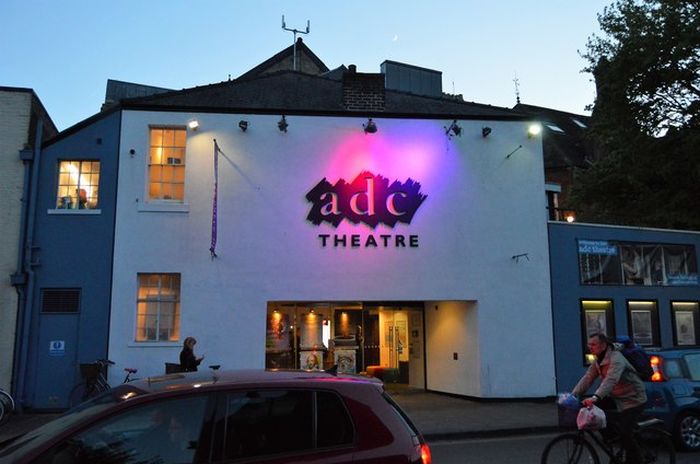A not so pathetical phallusy
Jasmine Regal Feldman reviews Tony Harrison’s The Trackers of Oxyrhynchus at the ADC

The ADC’s staging of Tony Harrison’s critically acclaimed 1990’s play, The Trackers of Oxyrhynchus, is a production worthy of the playwright’s beloved legacy. Although rarely performed, the ADC’s version seems to be true to the original, which is widely considered to be one of the best plays of the twentieth century. After being seated, I was fascinated by the staging. Huge Greek papyri banners hung from the ceiling and papers littered the floor. The play opened with the chaos of an Egyptian archaeological site and two Oxford dons searching for fragments of Sophocles’s The Ichneuntae. Once the fragment is found and sent to England, satyrs spring from crates on the stage to begin to stage Sophocles’s missing play. This opening exposes well Harrison’s desire to use classical theatre as a commentary on the contemporary culture of ‘high art’.
“The wild costuming was certainly one of the most memorable aspects of the show”
The performers brought the verse and story to life, bringing the might of the gods and the bawdiness of the satyrs from the classical tradition. The dichotomy between the archaeologists Grenfell (Christian Longstaff) and Hunt (Jake Turner), was heightened by Longstaff’s excellent and dramatic portrayal as the philhellenist so obsessed and consumed with his work, he is possessed by the god Apollo. Longstaff and Turner gave equally good performances as their Greek literary counterparts (Turner as Silenus) that masterfully translated their archaeological personas into gods and satyrs. There was a tendency among the cast to shout rather than act; not only was this unnecessary but also distracting. While a powerful speech should be matched with the tone of voice, shouting throughout the performance means the play sometimes lost its punch when it mattered. As we found out, the only way to top shouting half your lines is to simply scream at the audience.
“Would [it] be a dream come true or an absolute nightmare for the artefacts to suddenly spring to life as well-endowed satyrs”
My main gripe, not necessarily with the ADC version but with Harrison’s writing, is the hypocrisy in a play. While an interesting exploration of the class structures that dictate the distinction between ‘high art’ and noise pollution it was inaccessible to anyone without thorough classical training. While the verse is interesting and well crafted, at times the progression of the story is lost in lines laden with classical lexicon. I think Harrison is sometimes so wrapped up in his cleverness, that he failed to recognise that the rhythmic pattern and rhyming scheme of the verse make some of the play sounds an awful lot like a Dr Seuss book. Perhaps there is an irony of it all that is escaping me.
The wild costuming, by Tom Chandler, was certainly one of the most memorable aspects of the show. Elegant toga-clad gods were in strong contrast to the satyrs trotting across the stage, enormous limp phalli swinging and so long that they were very nearly trailing behind them. Though incredibly distracting, I believe the long phalli are a Grecian motif representing the ‘low art’ of the satyrs that Apollo condemns them to, by stopping them from playing his precious lyre. From a bit of research, the phalli were erect in the original production, making me somewhat glad Chandler chose a (literally) less in-your-face option, although the ADC’s version of the production was only flaccid in costume style.

Review Top shows of the year
Though the verse theatre of The Trackers of Oxyrhynchus is witty, it is sometimes as garbled as its title resulting in masking the interesting story and well-done performances. Though the artistic critiques and themes in the play aren’t lost, it comes across as quite pretentious. Since the play is more than thirty years old, it is expected that the message has dated slightly as the distinction between ‘high and low’ art, and academics and the public is slowly eroded. The notion of out-of-touch archaeologists is certainly worthy commentary, but I’m sure Harrison would be pleased to see the shifts in the academic world over the last three decades. As an archaeologist, I found myself wondering whether it would be a dream come true or an absolute nightmare for the artefacts to suddenly spring to life as well-endowed satyrs but, I think I might keep the answer to that particular question to myself.
 Film & TV / Adolescence: understanding the manosphere5 April 2025
Film & TV / Adolescence: understanding the manosphere5 April 2025 Lifestyle / Which college brunch should be next on your list?6 April 2025
Lifestyle / Which college brunch should be next on your list?6 April 2025 News / Under 3% of applicants for Cambridge academic jobs are successful7 April 2025
News / Under 3% of applicants for Cambridge academic jobs are successful7 April 2025 News / News in Brief: cats, Camelot, and construction woes6 April 2025
News / News in Brief: cats, Camelot, and construction woes6 April 2025 News / Boat race rowers in danger of sepsis and kidney failure from polluted water5 April 2025
News / Boat race rowers in danger of sepsis and kidney failure from polluted water5 April 2025





